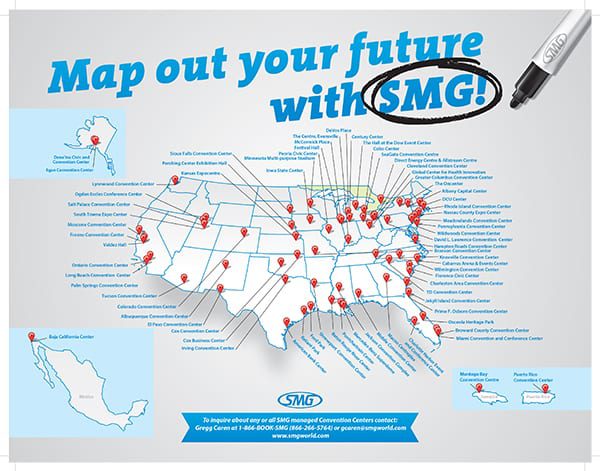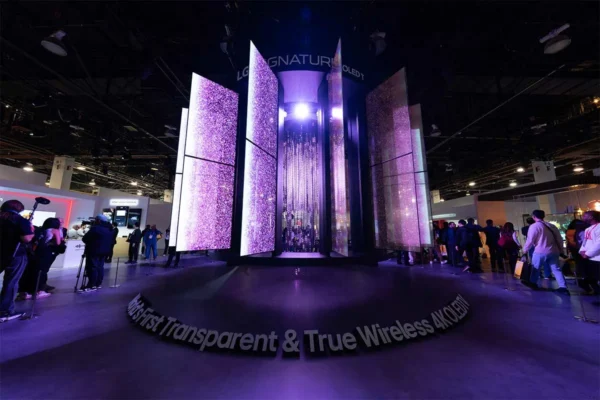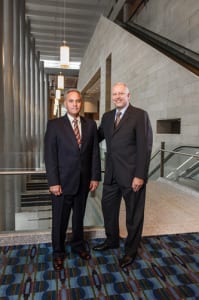
Yin and Yang
Forming a “yin and yang” team at SMG, a leader in venue management, marketing and development, Gregg Caren, executive vice president – convention and exhibition centers, and Bob McClintock, COO and senior vice president – convention centers, are a formidable force to be reckoned with in their field.
In the last four years, Caren, who concentrates on national sales business development, and McClintock, whose forte includes enhancing the exhibitor experience and collaborating with the public sector, have won 13 of their 14 bids, including three major U.S. facilities.
“Bob and I have developed a great partnership,” said Caren. “Bob’s expertise is in all areas of operations, but especially working with collective bargaining units. My background and focus are on business development – winning new contracts for SMG – and national sales – working with our local sales teams and CVBs to leverage relationships and book business.”
SMG operates 74 convention centers with 15 million square feet of prime space under its management, including nine of the top 40 convention centers in North America. Overall, the firm manages 240 facilities of all types across nine countries.
From recession to progression
Between 2008 and 2010, the exhibition industry experienced a lull directly attributed to the economic recession. But the low demand for sourcing private management operators would take a turn by the close of 2010.
Explaining the recent trend of convention centers hiring private management firms, Caren stated that mostly small to mid-sized facilities had sought professional management in the prior decade. That was until Detroit’s Cobo Center privatized in 2010. Previously run by the Detroit Regional Convention Facility Authority, the facility awarded a contract to SMG in October 2010 to handle its operations.
As the largest convention center to hand over the reins to a venue management firm at that time, Cobo Center set a precedent for other sizable facilities to follow suit. In a subsequent domino effect, SMG also snatched up McCormick Place, the largest convention center in the U.S as well as the Pennsylvania Convention Center, located in Philadelphia.
Evolution
Elevating the exhibitor experience
Attributing its recent high success rate to SMG’s focus on the exhibitor experience, the duo concentrates on customer service from the “back docks” as much as the “front door.”

“Much of the biggest shift for some of these venues, and SMG’s modus operandi at venues like McCormick Place and the Pennsylvania Convention Center, has been on the exhibitor experience,” Caren acknowledged. “A combined focus on customer (exhibitor) service and services, price value and constructive engagement with trade unions have been rewriting how these venues do business, and led to numerous new and renewed bookings.”
Returning to its roots, Caren credited founder A.N. Pritzker’s hospitality background and hotel experience for the fine attention to detail and high level of customer service. Pritzker founded Facilities Management Group (FMG) in 1977 to manage its first account – the Mercedes Benz Superdome in New Orleans – as well as the Grand Hyatt, which opened next to the Dome several years later.
Rebranded as Spectator Management Group, and later to be renamed SMG, the firm began its move toward privatizing venue management in the 1970s-80s.
“[The shift was] based on slight variations in ownership over time, but essentially the same core team and values have been in place since day one,” noted Caren.
Adopting a professional management approach as expected by meeting planners from prominent hotel brands, SMG worked to similarly deliver consistent, quality customer service for arenas, stadiums and convention centers.
Emphasizing the importance of keeping exhibition organizers satisfied, Caren identified exhibitors as a venue’s most valued client.
“While attendees are vital to any event, it’s the exhibitors who are paying the freight,” Caren stated.
With its end goal in sight, SMG resolved to balance the generation of revenue and management of expenses while never losing a focus on maximization of customer service.
Tipping the scales
Stakeholders in the convention cities of Chicago, Detroit and Philadelphia separately decided that a major change was needed to satisfy exhibitors at each respective convention center. Together, the three venues uprooted the long-time, industry-wide tendency of leaving facility management in the hands of public or quasi-governmental authorities.
Feedback from both show managers, who are a facility’s primary customer, and exhibitors, the economic drivers behind the success of every show, compelled stakeholders to reevaluate facility operations.
“Regardless of size, within a community the convention center is probably most expensive real estate investment of that community,” indicated Caren.
Factors considered in the decision to privatize management were the cost and experience of producing shows and events in the respective cities and overall customer experience as provided through management. Show managers and exhibitors look for professionalism, organization, available resources and, most importantly, to work constructively with organized labor to make substantive changes in doing business with their own customers.
In choosing a show venue, show management left cities where expenses were too high and/or poor experience and quality of service offered low ROI. To retain existing customers and attract new business, the cities of Chicago, Detroit and Philadelphia affected changes toward more cost-effective shows and improved customer experiences.
By turning to private venue management firm SMG, the new facility operator was able to bring each convention center in line with the cities’ unique business models.
Cobo Center – Detroit
The nation’s beloved “Motor City” faced numerous financial crises following the demise of several American automakers in the 2000s. Even with a government bailout, Detroit was facing bankruptcy.
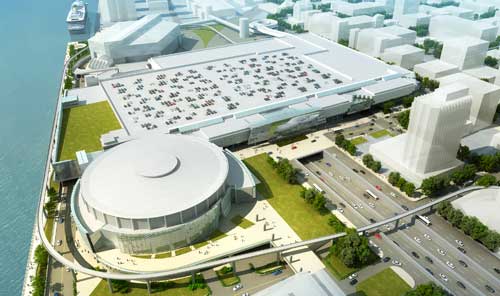
Met with threats from existing shows to leave the city if working conditions at Cobo Center were not changed, officials were prompted to regroup. Consequently, Detroit Regional Convention Facility Authority handed over operations of the convention center to SMG in 2010.
The Authority’s decision to invest in expanding the Efficiency Memorandum changed the facility’s fate. A right of entry document similar to a customer satisfaction agreement, the Efficiency Memorandum established work rules and conditions for show labor. New regulations governed standards for behavior and dress as well as hours of work at Cobo.
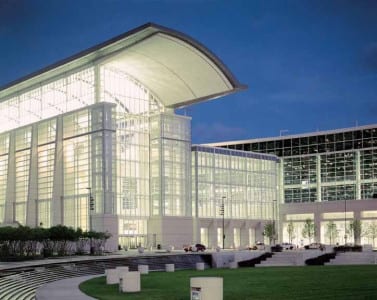
McCormick Place – Chicago
Approximately one year after Detroit made the move to privatization, Chicago, home to the largest convention center in the U.S., followed in its footsteps. Driven by legislative reform, the move proved evolutionary for the exhibition industry as a whole.
Tradeshows serve as a significant economic engine for the Windy City. Prior to privatization, however, Chicago risked losing existing customers and new business due to unsatisfied customers at McCormick Place.
State government-led reforms resulted in structural changes in management as well as funding mechanisms to make certain services non-exclusive or at-cost at the convention center. Labor changes added to efforts to improve the customer experience.

Pennsylvania Convention Center – Philadelphia
Unlike Detroit and Chicago, Philadelphia’s move to privatization began with management changes. Realizing that signed contracts with long-time shows were not being renewed, SMG, as the new operator of Pennsylvania Convention Center (PACC), worked with its Board and labor leaders on a new Customer Satisfaction Agreement, forming a true partnership with the organized labor.
Understanding the importance of providing quality customer service, several unions at the Convention Center worked in conjunction with management to reassess the customer experience. McClintock attributed the turnaround at PACC to signatory unions performing work under the new customer agreement.
“Positive changes at PACC were due to the leadership and men and women of those organized labor groups. The condition of the show floor today is light years from the condition of PACC in the years prior to the new customer service agreement,” commended McClintock. “The [former] rules and attitudes were never presented to the customer as expected and deserved when they come to the city.”
SMG services
To further enhance the customer experience, SMG continually raises the bar on its internal practices. Opportunities for long-term career growth benefit both associates and municipal venue owner clients, according to SMG officials.
As the only company that provides both venue management and food & beverage in one solution, SMG offers the option of its SAVOR… culinary services to its customers. To expand its European reach for exhibition venues, SMG also partnered with Artexis, a respected brand in Europe.
“K’nekt” with customers
Large companies tend to procure third party training firms to instruct employees whereas SMG created its own in-house program in 2006. Creating peer-to-peer relationships among staff members, Caren believes that the “best solutions start in our own backyard.”
While managing Charleston Area Convention Center Complex in North Charleston, S.C., SMG developed a relationship with the College of Charleston, which houses its own hospitality program in the Tate School of Business. The program was used as a local resource to build SMG’s own system of training.
Offering customer service and sales training programs through an esteemed institute of higher education, K’nekt coaches SMG team members on best practices. The program grew to include an entire suite of skillsets including social media marketing, leveraging branding and training salespeople to act as national sales manager for the entire SMG network of facilities.
Onsite training at each venue allows trainers to evaluate and train all team members from line employees to general managers on advanced selling techniques to sales leadership and accountability. Alternatively, webinars are held for staff unable to attend courses at the Charleston campus or onsite at venues.

SAVOR…the catering
For SMG, food & beverage services are integral to operations. Its customer-driven entry into culinary arts led to the creation of an entirely separate division.
First asked to provide catering services at Moscone Center in San Francisco in the 1980s, SMG took over for the facility’s incumbent food & beverage provider. With a mandate from the mayor, Dick Shaff, vice president and general manager, Moscone Center, identified a need to deliver a different culinary experience highlighting San Francisco’s cuisine as one of the best dining cities in the U.S.
As part of a holistic guest experience, SAVOR… often helps municipal owners move from a commission-based to a fee model. Additionally, by allowing the general manager of an SMG facility to manage and negotiate food & beverage services, as does a hotel manager, facility owners can likely achieve better financial returns, as well as a better price-value for meeting planners.
Of 240 facilities managed by SMG, nearly half are also SAVOR… venues. A survey of McCormick Place clients validated the holistic practice with customers enjoying a farm-to-fork dishes prepared with fresh produce from its rooftop vegetable and herb garden. Under the direction of SAVOR…Chicago, customers can also dine at 23rd Street Café & Market, where many food items served are locally sourced and all meats served are raised without antibiotics (ABF).
SMG also services other massive food & beverage events from fine dining cuisine to food truck villages with menus reflecting the uniqueness of each respective destination.
Artexis-SMG: International offerings
A strong demand for SMG’s services in North America, including Canada, U.S., Mexico and the Caribbean, is making its way overseas to the European market. Started in the early 1990s, SMG-Europe predominantly focused on entertainment centers such as arenas, stadiums and theaters, and also managing a few convention centers.
Under the Messe model, most European venues typically provide both facility management and show management. Entering this market, SMG will work with Artexis, a reputable management firm that manages and leases or owns eight venues in Europe.
Combining the strength of SMG’s North American model with Artexis’ European success, the partnership under Artexis-SMG will be led by its first joint employee, Vice President, Business Development Håkan Gershagen, who worked for Reed Exhibitions in Europe.








